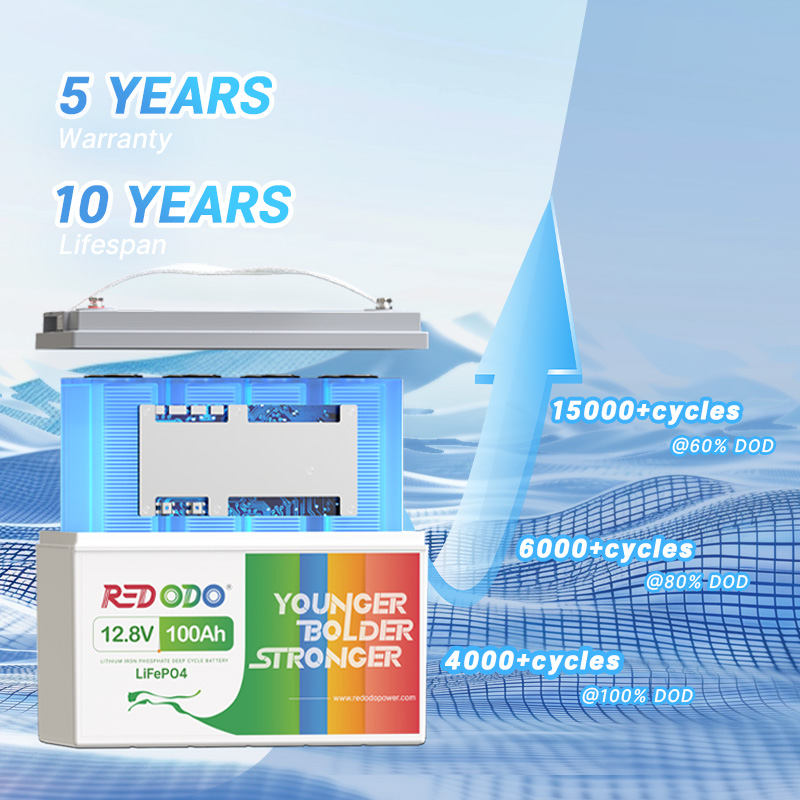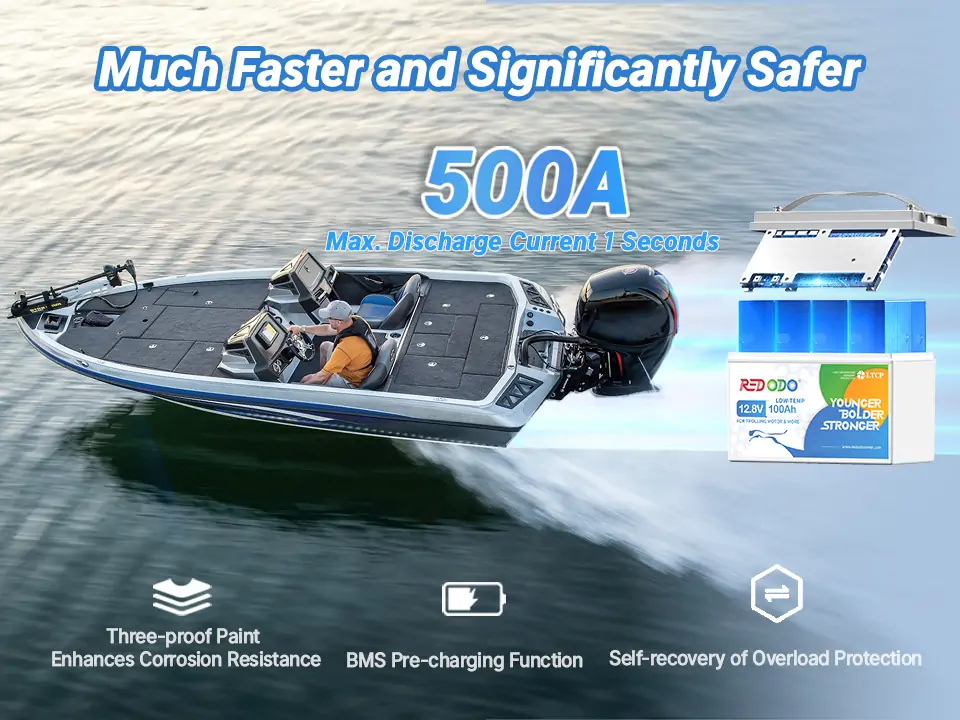Marine batteries are an essential component for any boat owner, providing the necessary power to start the engine, operate electronic devices, and ensure a smooth sailing experience. But one of the most common questions among boat owners is: how long do marine batteries last? Understanding the lifespan and maintenance tips of marine batteries can help you plan better and avoid unexpected breakdowns.
Table of Content
- What Type of Battery is A Marine Battery?
- What Type of Marine Battery is the Best?
- How Long Should a Marine Battery Last?
- Marine Battery Maintenance Tips to Extend Their Life
- When Marine Battery Needs to be Replaced?
- Are Lithium Batteries Worth the Upgrade?
- Do Lithium Batteries Require a Special Charger?
- How Long Does It Take to Charge A Marine Battery?
What Type of Battery is A Marine Battery?
A marine battery is a type of battery specifically designed for use in marine environments. Unlike regular car batteries, marine batteries are built to withstand the rigors of being on a boat, including constant vibration and exposure to moisture. They are designed to provide a steady amount of power over an extended period of time, making them ideal for powering trolling motors, fish finders, and other marine electronics.
Marine batteries come in different types. From the perspective of chemicals, they include flooded lead-acid, absorbed glass mat (AGM), gel cell batteries, and lithium batteries. Each type has its own advantages and disadvantages, such as maintenance requirements, durability, and cost. Read Trolling Motor Battery Type & Size to find their differences.
From the perspective of specific purpose, marine batteries can fall into three main types: starting batteries, deep cycle batteries, and house batteries. Understanding the different types of marine batteries can help you choose the right one for your needs.
- Starting Batteries
Starting batteries are designed to deliver a large burst of power for a short duration, sufficient to start your boat’s engine. They have thin plates that maximize the surface area for quick power discharge but are not designed for deep discharges.
- Deep Cycle Batteries
Deep cycle batteries are built to provide a steady amount of power over a longer period. They can withstand frequent discharges and recharges, making them ideal for powering electronics and trolling motors.
- Dual-purpose batteries
Dual-purpose batteries serve both starting and deep cycle purposes. They are versatile and can handle the demands of starting an engine while also providing steady power for onboard electronics.
Read more: [Comprehensive Guide] Types of Marine Battery
What Type of Marine Battery is the Best?
The best type of marine battery depends on your specific needs. Starting batteries are ideal for engines, while deep cycle batteries are better for trolling motors and electronics. House batteries offer a balance for those who need both starting power and deep cycle capabilities.
How Long Should a Marine Battery Last?
The lifespan of marine batteries varies depending on the type, usage, and maintenance. Flooded lead-acid batteries, the most common type, typically last 3-5 years with proper maintenance. AGM batteries have a longer lifespan of 4-7 years due to their sealed construction and resistance to vibration. Gel cell batteries also fall within this range, lasting 4-7 years.
However, when it comes to longevity, lithium batteries stand out. With a lifespan of 8-10 years, lithium batteries outlast other types by a significant margin. For example, Redodo lithium batteries can provide 4000+ cycles at 100% Depth of Discharge (DOD) and a 10-year lifetime. They are also lighter, have a higher energy density, and can be discharged more deeply without damage compared to traditional lead-acid batteries.
Marine Battery Maintenance Tips to Extend Their Life
Proper care and regular maintenance can extend the lifespan of marine batteries, specially lead-acid batteries. This includes keeping the batteries fully charged when not in use, avoiding overcharging or deep discharging, and ensuring proper ventilation during charging. Additionally, using a marine battery charger specifically designed for marine batteries can help prolong their lifespan.
- Regular Charging: Ensure your battery is always charged to avoid deep discharges which can shorten its lifespan. Avoid letting the battery discharge below 50% if possible. Using a smart charger that maintains the battery at an optimal level can be very beneficial.
- Clean Terminals: Regularly clean the battery terminals to prevent corrosion. Use a mixture of baking soda and water for effective cleaning. Apply a light coat of petroleum jelly or terminal protectant spray after cleaning to prevent future corrosion.
- Check Water Levels: For lead-acid batteries, regularly check and top off water levels with distilled water. Do this at least once a month, especially during hot weather when water can evaporate more quickly. Ensure the plates are always covered.
- Store Properly: Store batteries in a cool, dry place during the off-season. Use a battery maintainer to keep them charged. Avoid storing batteries directly on concrete floors, as this can cause them to discharge more quickly.
- Avoid Overcharging: Overcharging can lead to excessive heat and damage the battery. Use a charger with an automatic shut-off feature to prevent overcharging. Monitor the charging process and disconnect the charger once the battery is fully charged.
- Inspect for Damage: Regularly inspect your batteries for signs of damage, such as cracks, leaks, or bulges. Any physical damage can compromise the battery’s performance and safety.
- Equalization Charge: For lead-acid batteries, perform an equalization charge every few months. This process helps balance the voltage across all cells, reduces sulfation, and ensures better overall performance. For Lithium batteries, due to its low self-discharge rate, you just need to keep the right storage. Check the manufacturer’s guidelines for the correct procedure.
When Marine Battery Needs to be Replaced?
It's also important to regularly inspect the batteries for signs of corrosion, leaks, or damage, and to replace them as needed. Here are some detailed signs that your marine battery may need replacement:
- Slow Engine Crank: If the engine is slow to start, it could indicate a weak battery. A battery that struggles to provide the necessary power to start the engine is likely nearing the end of its life.
- Low Voltage: A fully charged battery should read around 12.6 volts. Anything below 12.4 volts may indicate a failing battery. Regularly check the voltage using a multimeter or a battery monitor. If the battery consistently shows low voltage even after charging, it may be time to replace it.
- Corrosion: Excessive corrosion on battery terminals can reduce efficiency and signal that the battery is nearing the end of its life. Inspect the terminals regularly for buildup. Clean any corrosion, but if it returns quickly or is extensive, it might be a sign of internal battery issues.
- Swollen Battery Case: Overcharging or internal damage can cause the battery case to swell, indicating a need for replacement. A swollen case is a clear sign of internal failure and should not be ignored, as it can lead to leaks or even explosions.
Read more: Do Lithium Batteries Leak? How to Prevent?
- Frequent Recharging: If your battery requires frequent recharging and doesn’t hold a charge for long, it’s a sign that the battery is wearing out. Batteries that discharge quickly even with minimal use are likely at the end of their lifespan.
- Age: Even if a battery appears to be functioning, consider its age. Most non-lithium marine batteries are designed to last between 3-5 years. If your battery is within this range or older, it’s wise to start planning for a replacement or upgrade your battery to lithium marine battery.
Are Lithium Batteries Worth the Upgrade?
Lithium batteries are becoming increasingly popular due to their numerous advantages over traditional lead-acid batteries. They offer a longer lifespan, lighter weight, and faster charging times. Although they come with a higher upfront cost, their longevity and efficiency can make them a worthwhile investment in the long run.
If your boat is presently equipped with a different marine battery type such as lead-acid, there's no cause for concern. Switching to lithium can be done without causing any damage. The time is ripe to elevate your marine battery to lithium.
For those looking for the best deep cycle marine battery, the Redodo 12V 100Ah Lithium Trolling Motor Battery is an ideal choice. It presents the specially upgraded 12V 100Ah battery with low-temp charging cutoff protection, featuring advanced enhancements in BMS, structure, and process.
Check out the best deep cycle lithium marine battery at Redodo, and upgrade your boat equipment today!
Do Lithium Batteries Require a Special Charger?
Yes, lithium batteries do require a special charger. Traditional chargers designed for lead-acid batteries may not have the appropriate charging profile for lithium batteries, which can lead to overcharging and damage. Ensure you use a charger specifically designed for lithium batteries to maximize their lifespan and performance.
Read More: Can I Charge LiFePO4 Battery with a Normal Charger?
How Long Does It Take to Charge A Marine Battery?
The time it takes to charge a marine battery depends on various factors, including the battery type, capacity, and the charger used. On average, a standard lead-acid battery (flooded, AGM, or gel) can take anywhere 8-16 hours to fully charge using a conventional charger.
In contrast, lithium batteries typically charge faster, often within 4 to 6 hours, thanks to their advanced technology and ability to accept higher charging currents. Using a smart charger with an appropriate amperage rating for your battery can help optimize charging efficiency and reduce the time required.

Conclusion
Understanding the lifespan and maintenance of marine batteries is crucial for any boat owner. By choosing the right type of battery and following proper maintenance practices, you can ensure a longer, more reliable performance from your marine batteries.
Considering the extended lifespan and superior performance, we recommend upgrading to a lithium marine battery for long-term use. This upgrade will help keep your boating experiences smooth and enjoyable!

Redodo

Redodo
Recent Post

How Long Does a Trolling Motor Battery Last?

Convert RV from Lead-Acid to Lithium Battery: A Complete Guide

How Long Will a 200Ah Battery Run an Air Conditioner?

A Full Review of Redodo 12V 140Ah Group 31 Deep Cycle Battery



![⚡[$220 after Sign-Up] Redodo 12V 100Ah Group 24 Deep Cycle LiFePO4 Lithium Battery | For Home, RV, Marine](http://www.redodopower.com/cdn/shop/files/Redodo_12V_100Ah_group_24_lithium_battery_6301965d-f6e8-467f-825f-3eec839b3e1f.jpg?v=1744105344)
![⚡[$220 after Sign-Up] Redodo 12V 100Ah Lithium Trolling Motor Battery With Low Temp Protection](http://www.redodopower.com/cdn/shop/files/Redodo12V100Ahlow-tempbattery.webp?v=1738462317)

![⚡[$239 after Sign-Up] Redodo 12V 100Ah Group 24 Bluetooth LiFePO4 Battery | Real-Time Battery Monitoring | For RV, Marine, Solar](http://www.redodopower.com/cdn/shop/files/Redodo_12V_100Ah_group_24_bluetooth_lithium_battery.jpg?v=1744253032)
![⚡[$220 after Sign-Up] Redodo 12V 100Ah Group 31 Bluetooth Lithium Battery | Real-Time Battery Monitoring | For RV, Marine, Solar](http://www.redodopower.com/cdn/shop/files/redodo_12v_100ah_bluetooth.webp?v=1744698930)
![⚡[$248 after Sign-Up] Redodo 12V 100Ah Plus Bluetooth Marine Battery | For Marine, Trolling Motors, RV](http://www.redodopower.com/cdn/shop/files/Redodo12V100AhOBMOutboardMotorLithiumMarineBattery.webp?v=1743584091)

![⚡[$266 after Sign-Up] Redodo 24V 50Ah Bluetooth Trolling Motor Battery | For 24V Trolling Motors with up to 100 lbs](http://www.redodopower.com/cdn/shop/files/Redodo24V50AhTrollingMotorBatterywithBluetooth02.webp?v=1741251660)
